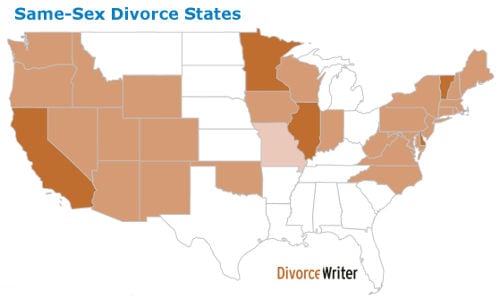Same-Sex Divorce
Update: This article was originally published in Fall of 2014 while many states were debating whether to allow same-sex marriage. On Friday June 26, 2015 the Supreme Court ruled in favor of same-sex marriage. The ruling affects all 50 states and makes it legal for same-sex couples to marry (and divorce) in every state. For more information on this ruling, see our article here.
For couples that live in one of the states where same-sex marriage is now legal, seeking a divorce in that state is no different than it would be for a traditional couple seeking a divorce.
However, for couples living in states that don’t recognize same-sex marriage, divorcing is much more difficult. If the state doesn’t recognize the marriage, most likely the state won’t grant a divorce. A couple living in Michigan can travel to any state where same-sex marriage is legal to wed, since none of the 50 states have residency requirements in order to obtain a marriage license. When the couple returns to a state like Michigan where their same-sex marriage is not recognized, the courts will not allow a divorce. The couple now has two choices: remain married, or move to a state that recognizes same-sex marriage in order to obtain a divorce.
Now comes the second obstacle: in order to divorce, unlike marriage, you have to meet the state’s residency requirement, which applies to all same-sex and traditional divorces. Except for Alaska and Washington (which have no minimum residency requirements), the remaining states’ residency requirements range from six weeks (Idaho and Nevada) to as long as two years.
To complicate matters further, some states (Iowa and Massachusetts, for example) require that you aren’t just establishing residency for the purpose of getting a divorce, but that at least one member of the relationship plans to live there for a longer, undetermined amount of time, establishing domicile.
On a good note, seven states have made an exception to their residency requirement for same-sex couples wanting a divorce.
| State(s) | Exception to Residency Requirement |
|---|---|
| California | Non-resident same-sex couples can divorce in California only if they were married in California and neither spouse lives in a state that recognizes same-sex marriage. The couple must file for divorce in the same county where they married. |
| Delaware DC Hawaii Minnesota | Non-resident same-sex couples can divorce in these states only if they were married in the same state and neither spouse lives in a state that recognizes same-sex marriage. For example, a same-sex couple can divorce in Delaware as long as they were married there and currently live in a state where same-sex marriage is illegal. |
| Illinois | Non-resident same-sex couples can divorce in Illinois if they were married in Illinois and neither spouse lives in a state that recognizes same-sex marriage. It is important to note here that most counties in IL grant marriage licenses to non-resident same-sex couples ONLY IF they live in a state where same-sex marriage is not declared void. States that declare same-sex marriage void are: AZ, AR, KS, KY, MS, SC, and TX. |
| Vermont | Non-resident same-sex couples can divorce in Vermont only if they were married in Vermont, neither spouse lives in a state that recognizes same-sex marriage, there are no minor children (born or adopted), and all issues of the divorce must be uncontested. |

Map from October 2014
On October 6th, 2014 a state circuit judge ruled that Missouri has no right to refuse to recognize gay marriages issued in other states. This means that as long as the couple meets the residency requirement for divorce in Missouri, the courts would grant the same-sex divorce. The Missouri Supreme Court ended up overturning this decision in February 2015.
In a nutshell, the same sex couple wishing to divorce has the following options:
- Divorce in one of the seven states with residency requirement waivers, but only if you were married there.
- Live in a state where same-sex marriage is legal long enough for one of the spouses to meet the residency requirements for divorce there.
- Live in Missouri for 90 days to meet the residency requirement for same-sex divorce.
If none of these are viable options for couples living in a state where same-sex marriage is illegal, the only real option is to stay married and hope that more same-sex marriage states waive their divorce residency requirements.
